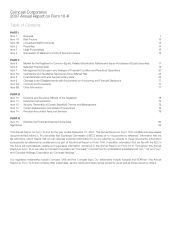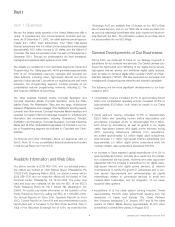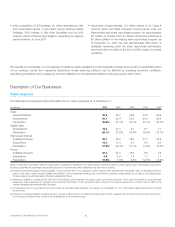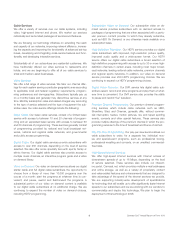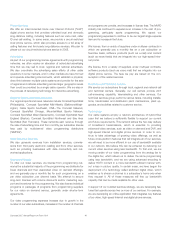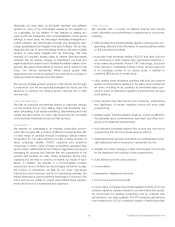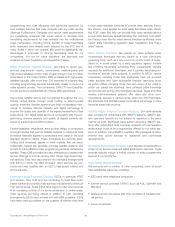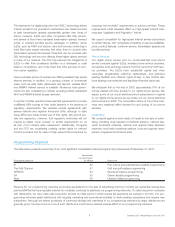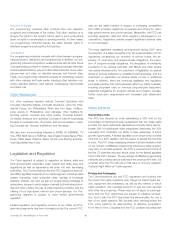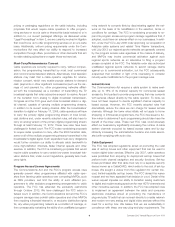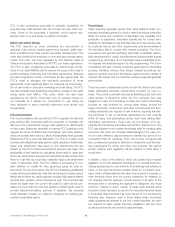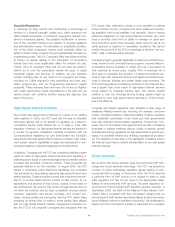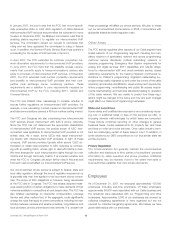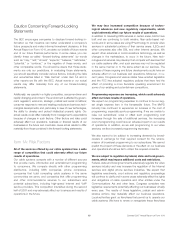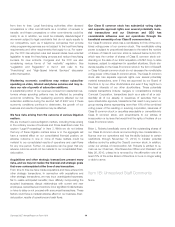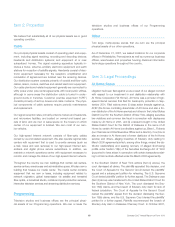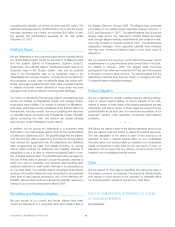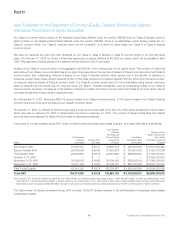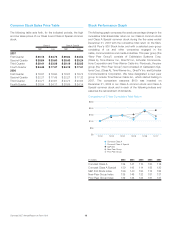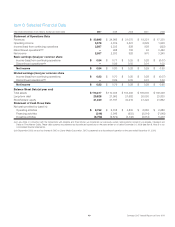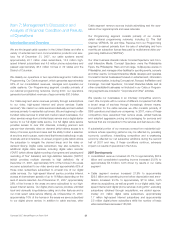Comcast 2007 Annual Report Download - page 12
Download and view the complete annual report
Please find page 12 of the 2007 Comcast annual report below. You can navigate through the pages in the report by either clicking on the pages listed below, or by using the keyword search tool below to find specific information within the annual report.FCC is also considering proposals to establish regulations for
plug-and-play retail devices that can access two-way cable ser-
vices. Some of the proposals, if adopted, would impose sub-
stantial costs on us and impair our ability to innovate.
MDUs and Inside Wiring
The FCC adopted an order prohibiting the enforcement of
exclusive video service access agreements between cable oper-
ators and MDUs and other private real estate developments. The
order also prohibits the execution of new exclusive access agree-
ments. The order has been appealed by the National Cable &
Telecommunications Association (“NCTA”), our trade organization.
The FCC is also considering proposals to extend these prohib-
itions to non-cable MVPDs and to expand the scope of the rules to
prohibit exclusive marketing and bulk billing agreements. Because
we have a significant number of exclusive access agreements, the
FCC’s order to abrogate the exclusivity provisions of those
agreements could negatively affect our business, as would adop-
tion of new limits on exclusive marketing and bulk billing. The FCC
has also adopted rules facilitating competitors’ access to the cable
wiring inside such MDUs. This order, which has also been
appealed by the NCTA, could also have an adverse impact on
our business as it allows our competitors to use wiring we
have deployed to reach potential customers more quickly and
inexpensively.
Pole Attachments
The Communications Act permits the FCC to regulate the rate that
pole-owning utility companies (with the exception of municipal util-
ities and rural cooperatives) charge cable systems for attachments
to their poles. States are permitted to preempt FCC jurisdiction and
regulate the terms of attachments themselves, and many states in
which we operate have done so. Most of these states have generally
followed the FCC’s pole rate standards. The FCC or a state could
increase pole attachment rates paid by cable operators. Additionally,
higher pole attachment rates apply to pole attachments that are
subject to the FCC’s telecommunications services pole rates. The
applicability of and method for calculating those rates for cable sys-
tems over which phone services are transmitted remain unclear, and
there is a risk that we could face materially higher pole attachment
costs. In November 2007, the FCC initiated a proceeding to con-
sider whether to modify its rules governing prices for pole at-
tachments. Among other issues, the FCC is considering establishing
a new unified pole attachment rate that would apply to cable system
attachments where the cable operator provides high-speed Internet
services and, perhaps, phone services as well. The proposed rate
would be higher than the current rate paid by cable service pro-
viders but lower than the rate that applies to attachments used to
provide telecommunications services. If adopted, this proposal
could materially increase our costs by increasing our existing pay-
ments for pole attachments.
Franchising
Cable operators generally operate their cable systems under non-
exclusive franchises granted by local or state franchising authorities.
While the terms and conditions of franchises vary materially from
jurisdiction to jurisdiction, franchises typically last for a fixed term;
obligate the franchisee to pay franchise fees and meet service qual-
ity, customer service and other requirements; and are terminable if
the franchisee fails to comply with material provisions. The Com-
munications Act permits franchising authorities to establish reason-
able requirements for public, educational and governmental access
programming, and many of our franchises require substantial chan-
nel capacity and financial support for this programming. The Com-
munications Act also contains provisions governing the franchising
process, including, among other things, renewal procedures de-
signed to protect incumbent franchisees against arbitrary denials of
renewal. We believe that our franchise renewal prospects generally
are favorable.
There has been considerable activity at both the federal and state
levels addressing franchise requirements imposed on new en-
trants. This activity is primarily directed at facilitating ILEC entry into
cable service. In December 2006, the FCC adopted new rules
designed to ease the franchising process and reduce franchising
burdens for new entrants by, among other things, limiting the
range of financial, construction and other commitments that fran-
chising authorities can request of new entrants, requiring franchis-
ing authorities to act on franchise applications by new entrants
within 90 days, and preempting certain local “level playing field”
franchising requirements. These rules are the subject of an ap-
peal filed by franchising authorities and NCTA in federal court. The
FCC has adopted more modest franchising relief for existing cable
operators. We could be materially disadvantaged if the rules con-
tinue to set a different, less burdensome standard for some of our
competitors than for ourselves. From time to time, Congress has
also considered proposals to eliminate or streamline local franchis-
ing requirements for ILECs and other new entrants. We cannot
predict whether such legislation will be enacted or what effect it
would have.
In addition, many of the states in which we operate have enacted
legislation to provide statewide franchising or to simplify local fran-
chising requirements for new entrants, thus relieving new entrants of
many of the local franchising burdens faced by incumbent oper-
ators. Some of these statutes also allow new entrants to operate on
more favorable terms than our current operations, for instance by
not requiring that the applicant provide service to all parts of the
franchise area or permitting the applicant to designate only those
portions it wishes to serve. Certain of these state statutes allow
incumbent cable operators to opt into the new state franchise where
a competing state franchise has been issued for the incumbent’s
franchise area. However, even in those states where incumbent
cable operators are allowed to opt into a state franchise, we often
are required to retain certain franchise obligations that are more
burdensome than the new entrant’s state franchise.
Comcast 2007 Annual Report on Form 10-K 10


